Like your horror cosmic? Want to check out my story “In the City of the Idol”, which is me doing my best Clark Ashton Smith impression? Then check out the May issue of Cosmic Horror Monthly, available now at their website. And look, they even put my name on the cover!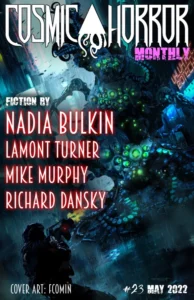
Author Archive: admin
Five For Writing – Jeremy Megargee
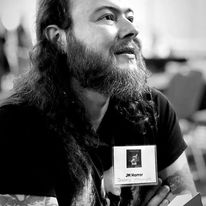 A rising star in the world of extreme horror. Jeremy Megargee is one of the nicest, sweetest guys you’d ever want to meet. A literary craftsman who deftly wields chills as well as gross-outs, Jeremy shares a table of contents with me in Counting Bodies Like Sheep. Yet despite that, he’s still willing to speak to me. Here’s Five For Writing with Jeremy Megargee.
A rising star in the world of extreme horror. Jeremy Megargee is one of the nicest, sweetest guys you’d ever want to meet. A literary craftsman who deftly wields chills as well as gross-outs, Jeremy shares a table of contents with me in Counting Bodies Like Sheep. Yet despite that, he’s still willing to speak to me. Here’s Five For Writing with Jeremy Megargee.
1-How does someone who’s a professional caregiver get into writing horror?
I’ve worn a few day job hats in my life, caregiver most recent, and prior to that I was a security shift supervisor/bouncer at a large casino. I don’t mind so much what I do for a living as long as it’s a tolerable environment/wage, but I’ve been passionate about writing horror since I was a little boy. The darker side of life has always been in my blood.
2-Mothman: Threat or menace? Or just a statue with nice abs and a great ass?
He’s both a threat and and a menace, but his booty cheeks are just as powerful as his wings. If you hear a flapping and clapping in the WV hills, Mothman is somewhere about. Bridgett Nelson, Jeff Strand, Lynne Hansen, and Damien Casey can back me up on this one.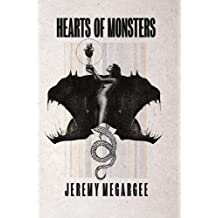
3-What impact does living in West Virginia have on your writing?
A huge impact. I think Appalachia is unlike any other place in the country. Pockets of isolation, valleys locked into green mountain barriers, and rural blue collar folk that are almost a throwback to an earlier era when coal was still king. Massive forests & people living hardscrabble lives. I love to write about those things.
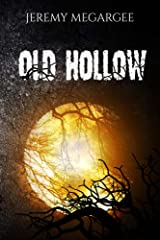 4-What’s the appeal of writing werewolves?
4-What’s the appeal of writing werewolves?
They’re my favorite supernatural creature. I think what appeals to me most is the nature of duality. The animalism behind the veil. We all have those primal instincts, and in werewolves, we can explore them fully. That’s what I took great pleasure in doing with my novel Old Hollow.
5-Do you prefer using traditional monsters or making up your own?
I can play with the old tropes, the pioneer monsters that paved the way and have established lore, but I think creating something unique that we haven’t seen before can be special. I play with some outlandish monster concepts in my short fiction.
Counting Bodies Like Sheep Now Available
The extreme horror anthology Counting Bodies Like Sheep from Evil Cookie is now available in hardcopy and eBook formats! Featuring a veritable who’s-who of extreme horror, it also contains my short story “The Taste of It Fresh”, which is by far the grossest thing I’ve ever written. I’m pleased and proud to be a part of this one, and you can order it here.
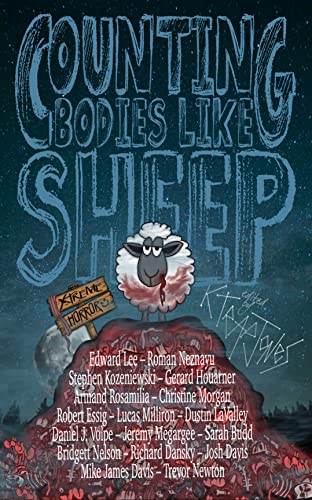
Five For Writing – Stephen Mark Rainey
Greensboro’s Stephen Mark Rainey is a celebrated author and editor in the horror genre. The guiding light behind the legendary Deathrealm magazine, he has a new short fiction collection coming out entitled Fugue Devil: Resurgence. He’s also a regular contributor to the Ameri-Scares series for young readers, and has written in the Dark Shadows universe. He’s also exceedingly generous with his time, and it is my pleasure to share with you his Five For Writing!

1-Your upcoming short fiction collection is titled Fugue Devil: Resurgence. What’s the link to the original “Fugue Devil,” which is now 30 years old?
“Fugue Devil,” the novelette, which I wrote in 1991 (and kicked off my original short fiction collection, Fugue Devil & Other Weird Horrors, from Macabre Ink, in 1992), was based on the most intense night terror I had as a youngster. It involved the appearance of a critter I found so horrific it actually traumatized me for a spell. The first time it appeared in the dream, I woke in a cold sweat — a weird sensation I’d never experienced before and never have since. Once I fell back to sleep, the dream continued right where it left off. I woke two more times, with the same result. The events in the story are nothing like those in the dream (which I still remember as clearly as any waking memory), but those crucial manifestations of the Fugue Devil itself are all there. The tale is what I might call faux folklore, and over the years, I ended up 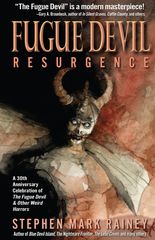
connecting it with other stories I wrote. Fugue Devil: Resurgence features the original novelette as well as its sequel, “The Devil’s Eye,” which takes up the story many years after the events of the first. The book also includes my story, “Threnody,” which is similarly based in faux folklore, and features more than a touch of what I guess you could call Lovecraftian horror. I’d written “Threnody” several years before “Fugue Devil” and rather unwittingly provided an origin story for the latter. So although each story is a standalone, taken together, they reveal a more detailed, fleshed-out chronicle of both the horror itself and the fictional locale. Some of the other stories in the collection, while not overtly related, are set in the same location — a rural community in southwestern Virginia.
2-You write for the Ameri-Scares series for young readers. What’s the appeal of writing horror for youngsters?
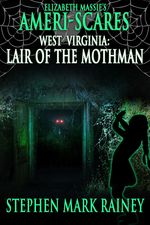 There’s definitely a sense of getting in touch with your inner kid. At first, that sounded pretty easy because my inner kid is one dominating young bastard. It did feel a little awkward simplifying the prose to mid-grade level, but once I became acclimated to it, getting into the stories has been great. I was able to set several of the books in places that I know well or have visited regularly — such as Georgia, Ohio, and Michigan. When I was writing my first book in the series — West Virginia: Lair of the Mothman — I went to Point Pleasant, WV, home of the legendary Mothman, for several days and, from the moment I arrived, found myself steeped in the lore. It was one of the most fun projects I’ve ever worked on, and — like all the Ameri-Scares books — I think it works as well for adults as it does for young readers. Prior to the pandemic, the Ameri-Scares series was being developed for television. Sadly, though, like so many properties, it didn’t stand up to COVID-19. That was a bit of a blow for both Elizabeth Massie and me because it had gone so far into production at the time. Regardless, the book series has continued to move forward, and I just finished my latest — Georgia: The Haunting of Tate’s Mill. It’s set in Gainesville, GA, around Lake Sidney Lanier, which is reputedly haunted. My mom grew up in Gainesville, and I spent a lot of time there with my grandparents over the years, so it’s a location I know well. I went back recently to research settings for the book, and I think that really paid off.
There’s definitely a sense of getting in touch with your inner kid. At first, that sounded pretty easy because my inner kid is one dominating young bastard. It did feel a little awkward simplifying the prose to mid-grade level, but once I became acclimated to it, getting into the stories has been great. I was able to set several of the books in places that I know well or have visited regularly — such as Georgia, Ohio, and Michigan. When I was writing my first book in the series — West Virginia: Lair of the Mothman — I went to Point Pleasant, WV, home of the legendary Mothman, for several days and, from the moment I arrived, found myself steeped in the lore. It was one of the most fun projects I’ve ever worked on, and — like all the Ameri-Scares books — I think it works as well for adults as it does for young readers. Prior to the pandemic, the Ameri-Scares series was being developed for television. Sadly, though, like so many properties, it didn’t stand up to COVID-19. That was a bit of a blow for both Elizabeth Massie and me because it had gone so far into production at the time. Regardless, the book series has continued to move forward, and I just finished my latest — Georgia: The Haunting of Tate’s Mill. It’s set in Gainesville, GA, around Lake Sidney Lanier, which is reputedly haunted. My mom grew up in Gainesville, and I spent a lot of time there with my grandparents over the years, so it’s a location I know well. I went back recently to research settings for the book, and I think that really paid off.
3-You edited Deathrealm magazine for a decade. What was that experience like, and would you ever go back to editing again?
Deathrealm offered more ups, downs, and all-arounds than I could begin to describe in a reasonable amount of space. As a teenager, I had started a fanzine (Japanese Giants), which I ended up passing to a couple of other editor/publishers. It continued for several years and, having been so involved with that, I decided to try my hand at an honest-to-god fiction magazine. That was in late 1986/early 1987. I had the resources to produce professionally typeset copy, which in those days was unheard of. From the start, things went swimmingly for the magazine and, over the years, it grew by leaps and bounds. It featured everyone from first-time writers to the most well-known authors in the field. In the early days, I published the magazine entirely on my own, but when I was laid off from my job in 1992, I lost my typesetting resources. Happily, another publisher picked it up, and Deathrealm received a whole new lease on life. That went on for a couple of years, and then that publisher decided to move on. Still another publisher stepped in — 1994, I believe that was — and in those next few years, Deathrealm hit its high mark. Every issue appeared on the newsstand shelves, the contributor list was impressive as hell, and the magazine looked freaking beautiful. However, getting it out there on a regular schedule took a hell of a toll. I couldn’t fit in much of my own writing, and there were troubles on the home front. The nail in the coffin was when our distributor to Barnes & Noble and other major chains went belly-up. That was a financial hit we couldn’t just absorb and keep going. So, in 1997, the publisher and I agreed it was time to retire Deathrealm. We did it right — we made the situation known up front, published every story we had acquired, and paid all our debts. I loved seeing Deathrealm on the shelves, and I loved the editing aspect. The business part, though, had become so overwhelming that my time actually editing was minuscule compared to the time I spent playing salesman, marketing expert, advertiser, accountant, and collection agent. I would never put myself through that again. I’ve edited a handful of anthologies, and I’ve pitched an all-new Deathrealm anthology a couple of times. There was even a deal with a well-known publisher to make it happen a few years back, but things ended up going south at the last minute. It’s a project I’d definitely consider reviving. But I don’t think I could deal with managing a regular publication, even digital, and continue to maintain a positive life balance.
4-How was the experience of writing something for Dark Shadows?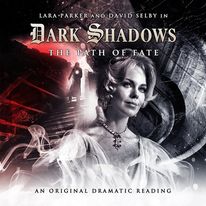
In my youth, I was a knocked-out, diehard Dark Shadows fan, and my love of the show continued well into adulthood. Having the opportunity to write a licensed novel for the franchise was something of a dream come true. I loved the creative part, and collaborating with Elizabeth Massie was a joy. Our respective styles and methods of working complemented each other wonderfully. And then writing audio drama scripts for Big Finish’s Dark Shadows audio series took the enjoyment to a whole new level. Now, that said, anytime you’re doing media tie-in work, there are challenges — such as, in our case, working with producers and a publisher who never much communicated with each other and whose requirements of us writers sometimes conflicted. Even with an agent, getting paid in timely fashion — or at all — was not the world’s easiest task either. I can’t deny the novel experience dampened my enthusiasm for Dark Shadows for a time, but that was short-term. I really did enjoy the creative aspect of working in the Dark Shadows universe, and I suppose I’d do it again if invited. I recently did the production work for a new nonfiction Dark Shadows book, and I must say that loved the experience. I also have an essay about my Dark Shadows experiences coming up in a new nonfiction volume, due very soon.
5-You are a self-described avid geocacher. What’s the appeal?
I discovered geocaching — a kind of treasure hunt using GPS technology — in 2007, found my first geocache in early 2008, and I’ve been a geocaching addict ever since. Since I was a youngster, I’ve loved getting out in the woods, hiking, and especially finding unusual things. Geocaching opens the door to all that and then some. Through geocaching, I’ve discovered the most fantastic locations I’ve ever experienced — many close to home but that I’d otherwise never even know about. Going after caches gives me a solid goal when I’m hiking or traveling, which I definitely appreciate. And it’s been a healthy activity. I credit caching for prompting me to quit smoking. When I first started caching, it became clear that I could either smoke or get out there and undertake rigorous physical challenges. I opted for the physical challenges. That was well over a decade ago, and I’ve never regretted that decision. Now, I do love what some consider more “extreme” geocaching, which often involves climbing way up in trees or other high places, or going down in storm drains, underground labyrinths, and such, sometimes for miles. Caching underground sure cured me of my arachnophobia — I’ve ended up in enclosed spaces filled to the brim with big honking spiders (and/or black widows), a prospect that once would have paralyzed me with terror. Now, not so much. And I have had a couple of close brushes with copperheads, one of which chased me for a while. That makes for a hell of an adrenaline rush, I can tell you. My geocaching experiences have been fantastic inspirations for writing fiction, that much is certain.
Many thanks for the great answers! This interview was truly a pleasure to do, and I look forward to renewing acquaintances with the Fugue Devil. Until next week, when I’ll be bringing you Five For Writing with rising splatterpunk author Jeremy Megargee!
Counting Bodies Like Sheep Available For Preorder
Yes, it’s true – the extreme horror anthology Counting Bodies Like Sheep, which includes my story “The Taste of It Fresh”, is available for preorder. It’s sick. It’s twisted. It’s horrifying. And I’m happy to be a part of it.

Five For Writing – Michael G. Williams
Versatile and talented, Michael G, Williams is the winner of the 2020 Manly Wade Wellman Award, an honor which he richly deserved. He’s also the the author of the Withrow Chronicles, a series of books about a vampire living in modern North Carolina, a series of time-traveling adventures featuring the legendary Emperor Norton, and more. He also co-hosts the deliriously enjoyable Arcane Carolinas podcast, and he’s a staple on the North Carolina speculative fiction scene. It is my pleasure to present to you Five For Writing with Michael G. Williams.
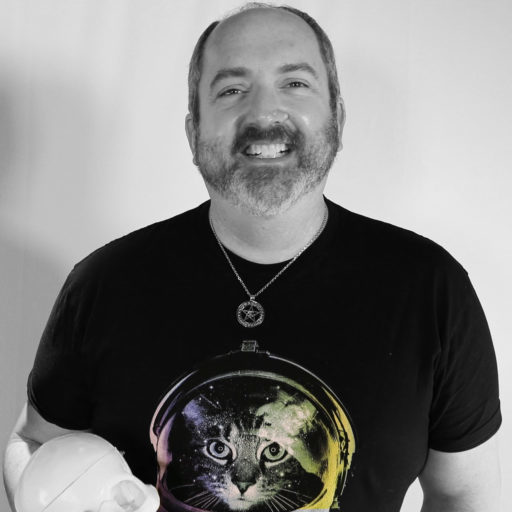
1-Why vampires? And why in North Carolina?
I always (only?) want to write about the queer experience in some way, and vampires are the perfect metaphor for how I want to represent my own experiences as a gay man. They’re always among humans but never quite of them and never quite free of them. They might choose to “pass” as human, they might not, and mostly I imagine they would find themselves negotiating that choice contextually, night to night, moment to moment, century to century. They have a secret truth they know many people actively fear and would readily attack them for revealing, and sometimes they most feel themselves only in situations they feel they must never reveal for fear of facing hatred. Each of those aligns in some way with significant elements of my own experience as a gay man living in a cishet world. From the first time I read Interview with the Vampire (may Anne Rice rest in well-earned peace), I’ve always seen vampirism as a useful mirror for reflecting back some of my own life as a queer person.
As for why NC, in part because I’ve lived here all my life and know it so well. Locations are easier to capture and convey when we’ve literally been there, and every book in The Withrow Chronicles is about a place I know well from firsthand experience. But also North Carolina because I love fish-out-of-water stories and the idea of a vampire getting by in the southeastern United States was a great chance to present several different takes on that and set up some interesting tension. Compelling characters, for me, always start in a place of untenable circumstances. Right out of the gate I want them in a place (literal or otherwise) they can’t stay. A vampire in suburban North Carolina would be running huge risks that might not even occur to us–or to them. The southeastern United States is a place where religion can be especially acidic and deviation from the mean can be met with especially sharp suspicion. That’s also true of the suburbs, regardless of region. I wanted to play with the idea of a vampire living in a suburban neighborhood with all the nosy neighbors and big box stores and everything else that involves, and how he handles it when his truths run headlong into the polite fictions of those environments. Vampire stories are almost always about some equivalent of the monster in the castle on the hill, whether that’s a literal castle or a skyscraper. I wanted a story about a guy who drives a regular car and writes his own check to pay his power bill, not some jetsetting bloodsucker. We have enough jetsetting bloodsuckers in reality.
2-You won the Manly Wade Wellman Award. How has that affected your life?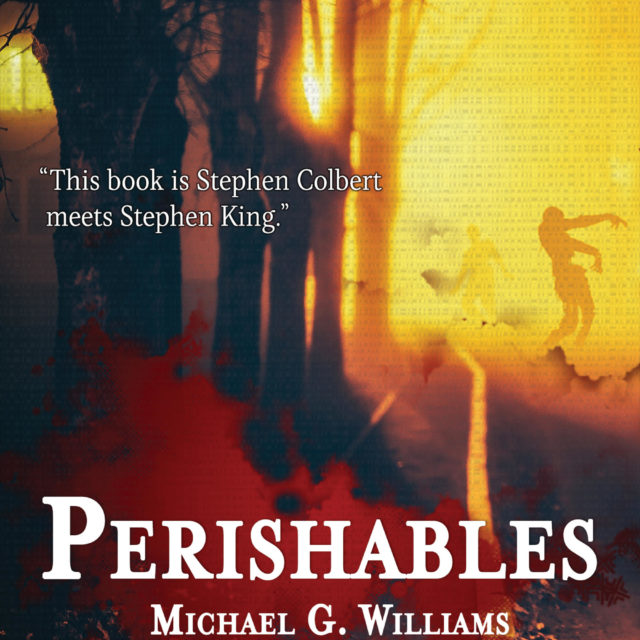
The biggest thing is that it gave me much-needed confidence to write my weird little stories and not constantly question my own instincts for topics and tone. A Fall in Autumn is a book I felt was uniquely “me” in that it includes some of my favorite flavors and inspirations and genre elements, and when I wrote it I remained absolutely convinced no one else would ever connect with it. Instead, this helped me really learn the lesson that people connect best and most with the stories that speak to us as writers. I used to respond to people who asked me about The Withrow Chronicles by saying, “Well, they’re not for everyone,” and I still think that’s true of everything else I write but the Manly Wade Wellman Award made me much braver with writing what I want to write and feeling confident it will be for someone. It’s also made it easier for me to try to find that someone who will really connect with it. I contend with both generalized anxiety and social anxiety and have never allowed myself to do much promotion out of fear of imagined negative consequences. The validation from winning the Wellman has allowed me to finally start working my way out from behind some of that.
Hand in hand with promoting myself, it gave me a little more of a platform to highlight other writers in the region who are also doing absolutely stunning work. Getting to announce the next winner at ConGregate in 2021, and having it be my friend and colleague Natania Barron, and to have some small role in recognizing her work, and the work of T. Frohock, who was a finalist and was also there, is a real privilege.
3-What is the Arcane Carolinas podcast, and what inspired it?
Arcane Carolinas is SO FUN! My friend and co-host Charlie and I talk about legends, lore, obscure history, and modern oddities found in North and South Carolina. (We originally described it to others as “The X-Files of the Carolinas.”) We’ve talked about everything from the Devil’s Tramping Ground to the Brown Mountain Lights to UFOs over Myrtle Beach to the Ghost Hound of Goshen Hill, South Carolina, and yet there is so much more to discuss! Every location in the Carolinas has something fascinating just under the first coat of paint or the first inch of earth: hidden history, a forgotten story, a local monster, a legend people mostly only hear in a song, you name it. We’ve done episodes that are hard science and episodes where we dig into census records to find out who a figure really was and episodes where we are 100% certain the whole thing was made up, and we’ve loved every one of them. Every place in the Carolinas has a story to tell–more like ten or twelve stories–and I will never get tired of unearthing those and seeing how they shine in the moonlight.
The story of its origins is funny, though, at least to us. Charlie and I used to work together. We already were making a podcast as part of our job, so we knew the tech and we knew we had a good rapport, a good dynamic. Through a series of other people’s departures and desks getting rearranged we wound up in cubes next to each other off on one end of the office, far away from everyone else, which allowed us to let our guard down and admit to enjoying this stuff and really bonding over that. Also, making a show about something purely for fun was a great way to have something to look forward to early in the pandemic and to grow a new community around something we all love.
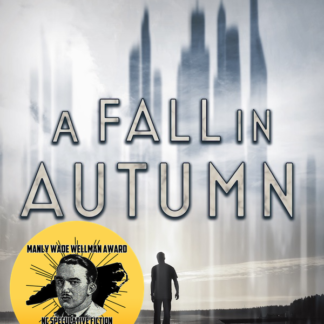 4-You bounce around genres quite a bit, from horror/urban fantasy to lighthearted time travel to science fiction noir. Is there one that speaks to you more than the others?
4-You bounce around genres quite a bit, from horror/urban fantasy to lighthearted time travel to science fiction noir. Is there one that speaks to you more than the others?
Oh, I think I’ll always be most interested in vampires and in detectives. (I will, eventually, write a vampire detective.) The vampires and witches who populate The Withrow Chronicles are always in the back of my head, whispering ideas, telling me what they’ve been up to. When the pandemic started, they were the characters I found my mind wandering toward, letting myself noodle around with, wondering how they were coping. (In the case of the vampires, at first they sort of scoffed at how some mortals rejected meaningful precautions that impose no real hardship; eventually they got depressed about what this might mean for the world they plan to live in forever. The witches do a much better job of keeping each other in good spirits but are extremely frustrated at the way magic can’t readily cure a problem of science.) I love all my characters and all my books, but the world I know I’ll go back to some day is The Withrow Chronicles. That’s the one I’m likeliest to grow into an expanded universe of novellas. It’ll just… be a few years.
5-What inspired you to write about Emperor Norton?
Norton embodies so much that is good and so much that is terrible about America, and about the struggles faced–and rewards reaped–by anyone who sets out to make themselves into someone they’ve been told they can never be. Here’s this guy who was king of the hill, a member of the most prestigious social club in San Francisco at the height of the gold rush, trading commodities in such volumes and so shrewdly that he had a very good chance of personally cornering the market on rice, a basic food staple heavily relied on by everyone else in the city. He was one part Dallas, one part tech-bro venture capitalist, and one bad break later, one too-ambitious overreach, he was destitute and totally vanished from the public eye.
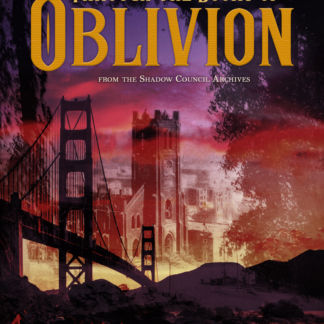 A few years later he walked into the offices of a newspaper, bought a small ad, and used it to declare himself Emperor of the United States and began issuing edicts. Rather than become some bitter, angry person willing to do anything and hurt anyone to get back into that position of privilege, he became a champion of the marginalized. He physically intervened on multiple occasions to stop racist attacks on people of color. He spoke out in favor of desegregating city transit, in favor of women’s suffrage, in favor of building a bridge to connect San Francisco and Oakland, and against judicial discrimination against poor people. City police were instructed to salute him when he passed. Theaters would reserve the best seat in the house on opening night, and if he attended the audience would rise at his entrance. He ate for free in restaurants, he attended lectures in science and medicine. He sold his own imperial treasury notes–and conveniently died a month before they could be redeemed. His image is still found all over San Francisco.
A few years later he walked into the offices of a newspaper, bought a small ad, and used it to declare himself Emperor of the United States and began issuing edicts. Rather than become some bitter, angry person willing to do anything and hurt anyone to get back into that position of privilege, he became a champion of the marginalized. He physically intervened on multiple occasions to stop racist attacks on people of color. He spoke out in favor of desegregating city transit, in favor of women’s suffrage, in favor of building a bridge to connect San Francisco and Oakland, and against judicial discrimination against poor people. City police were instructed to salute him when he passed. Theaters would reserve the best seat in the house on opening night, and if he attended the audience would rise at his entrance. He ate for free in restaurants, he attended lectures in science and medicine. He sold his own imperial treasury notes–and conveniently died a month before they could be redeemed. His image is still found all over San Francisco.
He also wore a mismatched wardrobe of donated clothing and discarded military uniforms and lived in a six-by-nine-foot room in a boarding house where he perpetually struggled to pay a pittance in rent while street vendors sold dolls in his likeness to tourists. People loved the idea of Norton, but the average person who might rise in a theatre or salute him on a city street did precious little to actually help him survive.
Norton spent the last two decades and change of his life scraping to get by and being a cultural force so powerful, and a voice for change so strong, that here we are talking about him a century and a half later–and still struggling with the same issues he tried to get his contemporaries to face. In a city where the neighborhood with the highest rates of homelessness and poverty (the Tenderloin) is bounded by a high-end shopping district (Union Square), startup-offices and tourist attractions (Market Street ), luxury mansions (Nob Hill), and the city’s palaces of government (Civic Center), the story of Emperor Norton is still powerfully relevant.
Norton consciously chose to remake himself, his identity, how he presented himself to the world, and the treatment he would accept as respectful afterward. Again, everything I write is ultimately going to touch on queer themes or otherwise reflect some aspect of the LGBTQIA+ experience as I live it and understand it, and I think a lot of queer people can see something of ourselves in Norton’s story. We do find ourselves culturally powerful, but many LGBTQIA+ people are otherwise politically, financially, and socially marginalized. We grow up in a world that tells us we can’t be who we are, and the more we work to realize who we know ourselves to be–the more we wield that cultural and personal and I’d even say spiritual power–the harder it becomes for us to “make it” in any other realm. Norton’s story is one of powerful personal vision and agency and of being an object of pity, even scorn. I will never not be fascinated by the lessons he can still teach us today.
Many thanks to Michael for giving such thoughtful answers. Check out his books and his website, and you’ll be glad you did!
Next week, I have the pleasure of sharing with you a Five for Writing with Steven Mark Rainey! Until then…
Five For Writing – Tony Tremblay
Tony Tremblay is one of the nicest people in horror fiction. He’s also extremely talented, as evidenced by his novels The Moore House and new title Do Not Weep For Me. An accomplished artisan and the host of The Taco Society show, he was kind enough to sit down for five questions on woodworking, being the house photographer at NECON, and more. Without further ado, here’s Five For Writing with Tony Tremblay.
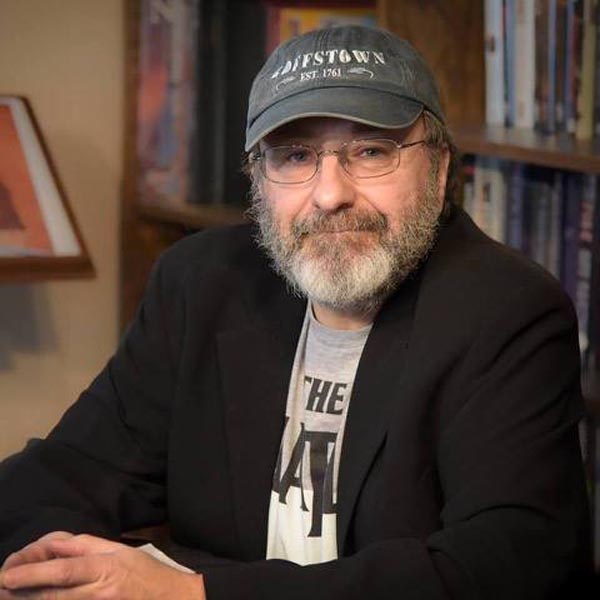 1-What got you into writing fiction?
1-What got you into writing fiction?
I’ve loved reading horror fiction since I was a kid. Authors like Ray Bradbury, Harlan Ellison, and Shirley Jackson made huge impressions on my young mind. As I grew older, Stephen King, Peter Straub, Bentley Little, and Graham Masterton to name a few, led to an obsession with the genre. Since I have been old enough to read, I’ve always wanted to write a horror tale, but I knew I didn’t have the chops. I was in my mid 50’s when I learned our local library had a writer’s group, and I decided to join. I had no illusions of fame or wealth, I simply wanted to write a story that would scare people like my literary heroes had, and hopefully, have it sit next to their works on someone’s shelf.
2-You’ve got two novels and two short story collections out. What’s next, and which format do you prefer more?
What’s next is a hybrid of the two—a novella. It’s a Halloween story in a collection of novellas which will be released around October. My contribution, Orange Eyes, is the tale of a taxi driver and a woman, unknown to each other, who have had their memories erased. As he and a new friend attempt to piece his history together, it’s eventually revealed that babies, sex, and the destruction of entire towns are connected to his memory loss.
As for a preference, I enjoy both, but short stories are harder to write. In a short story, a reader expects to have an engaging beginning, a non-cluttered and exciting middle, and a satisfying ending, and that’s tough to do in under 5,000 words. I enjoy that challenge. A novel gives me more space to accomplish those things so in a way, it’s easier to write. If pressed, I would pick writing a novel over a short story.
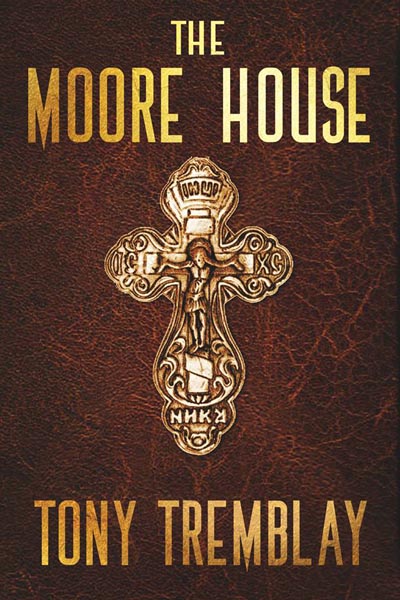 3-You do a lot of woodcraft. How does that compare to writing as a creative outlet? Is there any crossover?
3-You do a lot of woodcraft. How does that compare to writing as a creative outlet? Is there any crossover?
Great question! Many of my ideas when writing a story come to me as I’m doing mundane chores, and I don’t flesh them out until I sit at the computer. Woodcrafts are the opposite, they must be well planned out in advance, keeping the construction and the painting in mind. Only after I’ve figured out how to make a craft, does the work becomes automatic. I use that time to analyze whatever story I’m working on, thinking about plot holes and direction. As for crossover, I normally make non-horror woodcrafts, but I did make a limited series of zombie snowmen once.
4-You are the unofficial house photographer for NECON. Why and how did you pick up that mantle?
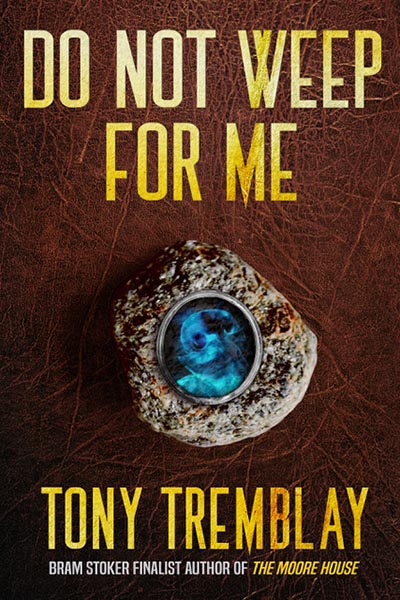 When I went to my first NECON, I took some pictures because I wanted to capture the faces of the horror authors who’s work I enjoyed so much. Later, when I posted them on Facebook, I was surprised by the response. Every year after that, I got to know more people, including other fans, so I took more pictures. At that first NECON, I think I took around 80 pictures, at the last NECON, I took over 650. All the good, and some not so good, pictures get posted to Facebook within days after the con. In my case, it seems to prolong that family feeling we all felt at NECON for a few more days.
When I went to my first NECON, I took some pictures because I wanted to capture the faces of the horror authors who’s work I enjoyed so much. Later, when I posted them on Facebook, I was surprised by the response. Every year after that, I got to know more people, including other fans, so I took more pictures. At that first NECON, I think I took around 80 pictures, at the last NECON, I took over 650. All the good, and some not so good, pictures get posted to Facebook within days after the con. In my case, it seems to prolong that family feeling we all felt at NECON for a few more days.
5-You’re an avid reader. What do you look for in a horror novel?
I want the beginning of the novel to bowl me over. I’d like it to invoke primal instincts, whether they be fight, flight, sadness, empathy, or fear. In simpler terms, I want the beginning of a tale to put me through an emotional workout. It doesn’t have to be horrific; I only want to feel something worth pursuing before I get to the second chapter. Once I’m involved with the novel, I’d like to read realistic dialog, multiple points of views without repetition, and action scenes that go beyond visceral. What I don’t want in a novel is to have to use a thesaurus every page, and to read endless amounts of internal musing or exposition.
Big thanks to Tony for his time and thoughtfulness! You can find him online at his website. Until next time, when I’ll be talking to Manly Wade Wellman Award winner Michael G. Williams!
Five For Writing – Bracken MacLeod
Bracken MacLeod writes some of the most gut-wrenching horror and suspense out there. He’s also one of the nicest guys I’ve ever met. The author of Stranded, Closing Costs and more, he is fearsomely bearded and awesomely gifted. This week, he sat down to answer five questions about subjects as diverse as gaming and toxic masculinity. For your reading pleasure, I give you Five For Writing with Bracken MacLeod.
 1-What drives a man to give up a perfectly reputable career like the law to focus on something as disreputable as writing?
1-What drives a man to give up a perfectly reputable career like the law to focus on something as disreputable as writing?
HA! The reputability of law is questionable at best. They’re both essentially storytelling professions. I wish I could tell you that a trial is a quest for the truth; it’s anything but. There isn’t a jury in America, or probably the world, that deliberates with true detachment based solely on the quality of facts presented in evidence. People want to be persuaded by a narrative and a character they can relate to and believe in. Trying a case is taking arguable facts, and attempting to build a story around them so to convince twelve people they ought to buy your version over your opponent’s. Given the kinds of cases I used to handle, I much prefer making up my own stories with purely imaginary stakes. As a writer, if I tell the tale unconvincingly, the worst that happens is a poor review.
2- Toxic masculinity is a theme you’ve examined in your work. Why did you choose to explore that?
Since I don’t write about supernatural monsters as much as I do real people in variably plausible situations, toxic masculinity is the kind of antagonistic force that haunts my imagination most when I’m imagining horror/thriller narratives. I think Bell Hooks put it perfectly when she wrote, “[A boy] learns that his core feelings cannot be expressed if they do not conform to the acceptable behaviors sexism defines as male. Asked to give up the true self in order to realize the patriarchal ideal, boys learn self- betrayal early and are rewarded for these acts of soul murder.” My newest book, Closing Costs, confronts this by depicting someone who is abusive and violent, but also completely unprepared for his manhood to be challenged or outdone in any way. His fragility is the source of his violence and suffering for everyone around him.
The consequences of a toxic derangement of the essence of a man’s emotional and intellectual wellbeing are at once as predictable and unpredictable as a game of Russian Roulette. Here’s something inerrantly destructive. We know that gun is going to go off eventually. What we don’t know is exactly when, or who is getting killed. Let’s play!
All of my books are issue driven. You don’t have to be tuned in to any particular issue to enjoy them, but if you are, I hope it helps the reader view something from a perspective that provides some insight.
3-You’ve published two highly successful collections of short fiction. Do you prefer short stories or novels, and why?
Novels, by far. They’re easier. I’m only partially kidding. Short stories are fun and I get to explore themes and situations I couldn’t in commercial novel length work, but what I really like to do is deep dive into emotional character experiences. The best place for me to do that is over the course of a novel. A short story and a novel can both have real hard impact, but I find it a lot harder to make that moment of emotional resonance really hit hard when you’ve barely gotten a chance to know a character.
 4-You’re an avid gamer. What’s the appeal of gaming to you?
4-You’re an avid gamer. What’s the appeal of gaming to you?
The biggest attraction is collaborative story-telling. I DM a 5e D&D game for my son and wife and some friends of ours, as well as an irregular Mörk Borg game with a bunch of other writers in my social circle. (Sometimes I get to be a player, but not often.) It’s such an amazing time to sit with engaged friends and create stories together. I’ve been playing tabletop RPGs since I was eleven or twelve, and had to take a long hiatus from play while I was practicing law (another reason to quit!). I never realized how much I missed it until I decided to try to teach my kid how to play.
I play video games too, but that’s a different animal. It’s participatory, but not all that collaborative when it comes to story. Then again, sometimes, you just gotta run and gun through waves of space demons with glowy swords.
5-What do you want to see in horror fiction that you haven’t seen yet?
That’s such a difficult question. Mostly, I want to see more of what I’ve seen too little of—stories that center the people and traditions that don’t often get the spotlight in traditional horror. Films like Get Out, the new Candyman, and The Vigil are perfect examples of what we need a lot more of in literature as well as cinema. Stories about traditionally overlooked people and cultures in their own stories, instead of as side characters and “exotic” threats for the same kind of protagonists we always see.
Huge thanks to Bracken for taking the time to give such thoughtful and thought-provoking answers! Until next time…
Counting Bodies Like Sheep
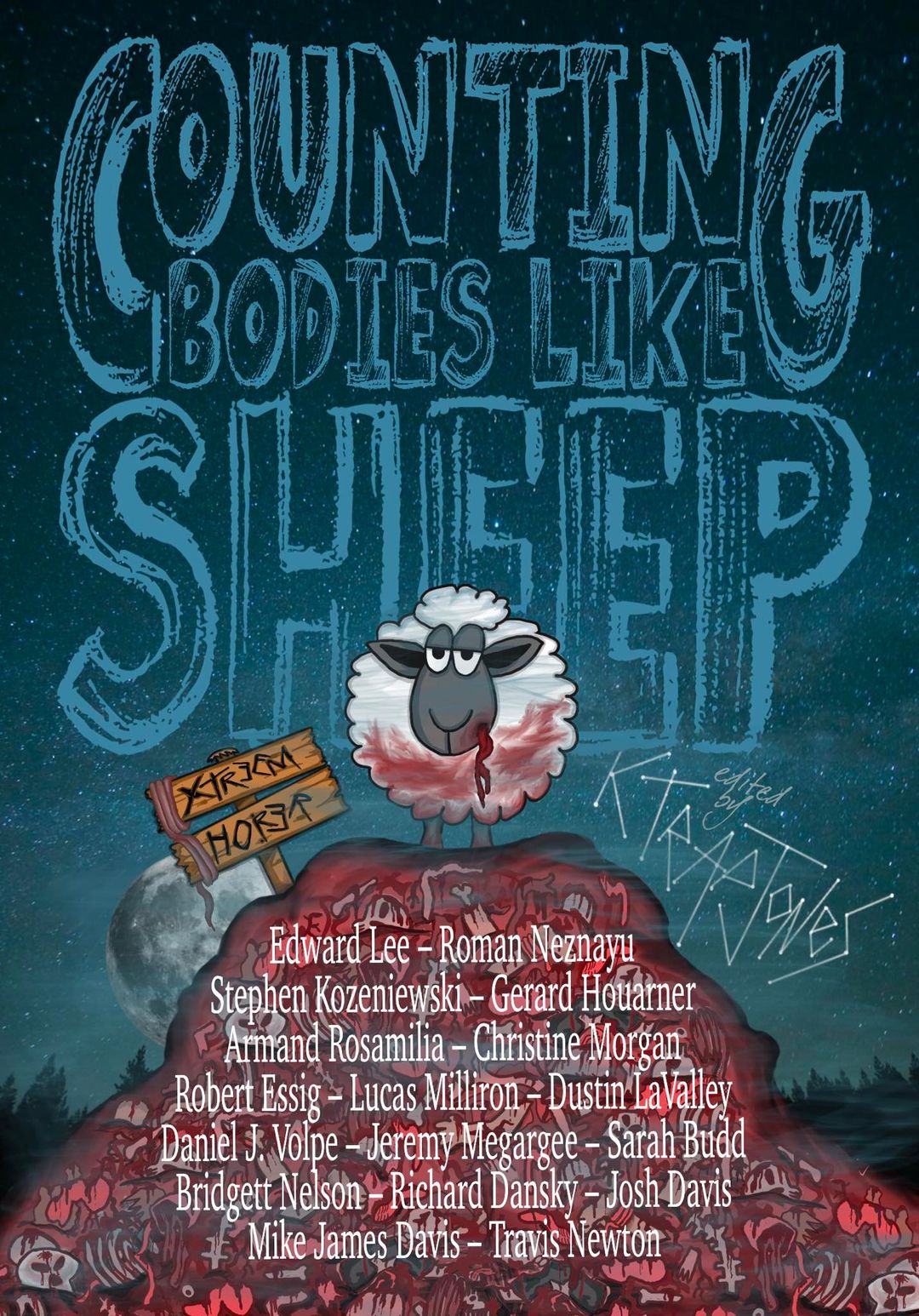
Pleased as punch at the cover reveal for the upcoming Evil Cookie anthology COUNTING BODIES LIKE SHEEP. It will include my story “The Taste of It Fresh”, which has more fluids in it than any other story I’ve ever written.
Kind Words For Ghost Of A Marriage
James A. Moore had some nice things to say about Ghost of a Marriage:
Richard Dansky’s voice is unique and compelling and his latest novel GHOST OF A MARRIAGE is a unique take on ghost stories and the tragedies that befall us, Funny, poignant, and terrifying in a truly phenomenal blend that stands head and shoulders above the average ghost story, Here is a ghost that will haunt you.–James A. Moore, author of the BLOOD RED series.
Now I’m blushing…